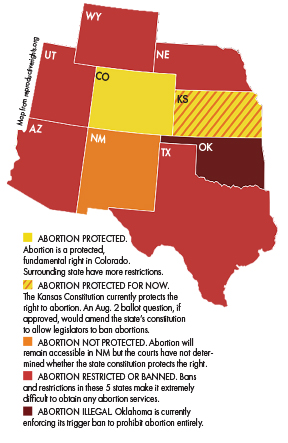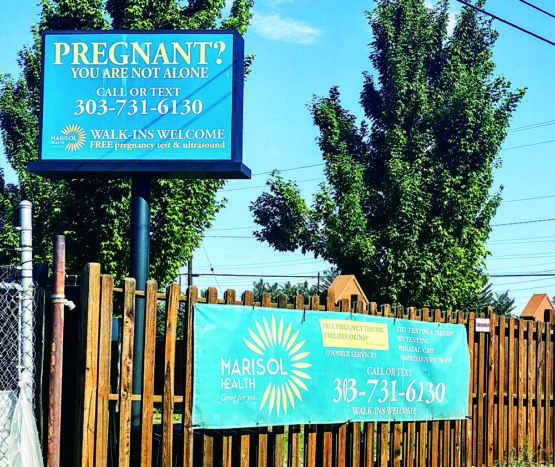
Terry Sullivan has been protesting abortion for 33 years and currently comes to the Park Hill Planned Parenthood abortion clinic location three days a week. Front Porch photo by Christie Gosch
Editor’s Note: In the original version of this article, quotes were mistakenly attributed to City Councilman Chris Herndon that should have been attributed to State Senator Chris Hansen. We apologize for the error.
Since the U.S. Supreme Court Dobbs decision in July reversed Roe v. Wade after 50 years of legal abortions nationwide, Colorado remains among the 24 states with laws protecting reproductive rights. Women from nearby states where abortion is now banned are increasingly turning to Colorado as their best option.
“We’re already seeing a clear influx of women from Texas and other states coming to Denver for a legal abortion,” says State Senator Chris Hansen. His observations are confirmed by two metro-area abortion providers.
“We’re experiencing a 500 percent increase in requests for services over the same period a year ago,” says Dr. Kristina Tocce, vice president and medical director for Planned Parenthood of the Rocky Mountains (PPRM). Appointments are filling four to six weeks in advance at the Planned Parenthood center in Park Hill, the largest facility in the Colorado PPRM system.
“Our phones are ringing non-stop,” says Colorado OB-GYN Michael Belmonte, MD, a Fellow of the Physicians for Reproductive Health who operates a private abortion and reproductive health clinic in Northeast Denver. He does not disclose the clinic’s exact location “to protect the privacy and safety of our patients.”
 Reproductive healthcare clinics offer a broad range of reproductive health services, including services for men, such as vasectomies. Services for women include regular checkups and prenatal care along with urgent care for such issues as bleeding and miscarriages. Dr. Tocce says abortions comprise only 10 percent of Planned Parenthood’s overall healthcare services.
Reproductive healthcare clinics offer a broad range of reproductive health services, including services for men, such as vasectomies. Services for women include regular checkups and prenatal care along with urgent care for such issues as bleeding and miscarriages. Dr. Tocce says abortions comprise only 10 percent of Planned Parenthood’s overall healthcare services.
These clinics “also are the most safe and comfortable places for non-binary people to go for their healthcare services, and these are now in jeopardy,” says Colorado House District 8 Representative Leslie Herod.
Most of the women served by these clinics struggle to afford healthcare, says Sen. Hansen. Will the availability of services for them be negatively impacted in the face of increasing demand from out-of-state patients?
Availability of Services
Colorado currently has about two dozen physicians and nurse practitioners providing abortion services to women in local clinics, mostly in metro Denver.
“We still have enough physicians performing abortions in Colorado for now,” but as more women come from other states, whether there will be enough physicians later is unclear, says Dr. Belmonte.
He’s also concerned about clinical staffing. “We’re trying to find more nurses qualified to help, and we also need more medical assistants along with more front desk and back office staff.”
Staffing shortages are being magnified by a fear of criminal reprisals from states that make it a felony to assist residents going out of state for abortions, says Sen. Hansen. “The legalities are uncertain. There are so many jurisdictions involved, and all this will play out in the courts, which I think is a huge waste of court resources.”

Marisol Health, run by the Catholic Charities Archdiocese of Denver, is directly across the street from Planned Parenthood in Park Hill and counsels women on options other than abortion. Front Porch photo by Christie Gosch
He adds that the reproductive clinics have little wiggle room to increase wages to attract more staff, as those costs would be passed on to patients, most of whom can’t afford to pay more.
Legal Implications
The 2022 Colorado Legislature passed the Reproductive Health Equity Act (HB22-1279). Signed in April by Governor Jared Polis, the law states that every Colorado woman has a “fundamental right” to continue a pregnancy and give birth or to have an abortion. The law further says “a fertilized egg, embryo, or fetus does not have independent or derivative rights under the laws of the state.”
Governor Polis on July 6 signed an executive order (D 2022 032) that directs the Department of Regulatory Affairs to protect Colorado healthcare providers from disciplinary actions against their licenses from other states. The executive order further says Colorado “will not cooperate with criminal or civil investigations in other states for health decisions that are legal in Colorado.”
Securing these rights, Colorado Attorney General Phil Weiser announced on July 11 that he will defend those coming here for abortions as well as doctors providing them. He vowed to file suit against any local or county government in Colorado that restricts reproductive healthcare.”
Costs
Nearly 100 percent of all abortion services are out-of-pocket expenses for patients, says Sen. Herndo. The scant insurance coverage available “is limited to specific indications,” such as incest or threats to the life of the mother.
Cobalt Advocates, a non-profit dedicated to reproductive rights and abortion access, is seeing increasing donations from Coloradans to offset these costs. “We’ve already fundraised more in the first half of 2022 than in all of 2021, and donations have tripled since the Dobbs decision in June,” says Laura Chapin.
Cobalt pays clinics directly for procedures and assists patients with other expenses such as transportation, hotel rooms, and food. In all of 2021, Cobalt provided $6,000 in practical support for 34 clients, says Chapin. In 2022, as of July 7, they had already paid out about $26,000 for 71 clients.
If medical bills are not paid in a reasonable time, they become collectible medical debt, says Daniel Lembert at the national charity RIP Medical Debt. “We don’t have any clear stats for medical debt created by abortion services, but these services increasingly are going to be rendered outside of traditional settings as abortion bans spread, so the hardship of abortion debt will be even harder to track.”
The majority of abortions today are medical abortions rather than procedural abortions, says Dr. Belmonte. “Both methods are extremely safe for the woman.” Complications occur at the rate of one in 10,000 or one in 100,000, depending on the length of gestation.
Dr. Belmonte says costs average from $500 to $1,000 and at most $3,000 for a procedural abortion performed in a clinical setting within 10 weeks of pregnancy. Costs jump from $10,000 to $20,000 or more for abortions performed in a hospital.
In contrast, a “medication abortion” using a prescribed pill can cost up to $750, but usually less, reports Planned Parenthood. The further along the pregnancy, the more expensive the procedure.
Patients in Colorado, New Mexico, California, and Illinois who lack access to a clinic can seek pills for medical abortions through the telemedicine services of MyChoix.com. Choix CEO Cindy Adams says medical abortion was “approved by the FDA for U.S. use in 2000, but it’s been used in Europe since the late 1980s.”
Note: Colorado Right to Life did not respond to two interview requests for this story.


0 Comments